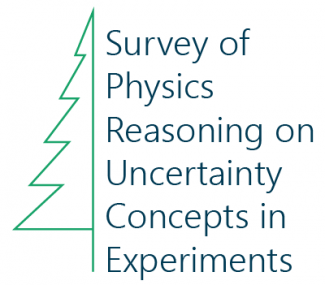We are currently developing a new research-based assessment instrument called the Survey of Physics Reasoning on Uncertainty Concepts in Experiments (SPRUCE). We are doing this in partnership with Prof. Rachel Henderson and Prof. Marcos D. Caballero at Michigan State University (see here). SPRUCE will measure student learning connected to measurement uncertainty at the intro undergraduate level in the context of experimental physics.
Our process for developing SPRUCE is based on Evidence-Centered Design (ECD). We started by interviewing intro physics lab instructors at a range of institutions across the United States, asking them about the concepts, practices, and activities connected to measurement uncertainty. This Domain Analysis process serves as the foundation for Domain Modeling, which in turn supports the Conceptual Assessment Framework and the Assessment Implementation and Delivery.



 The Physics Frontiers Centers (PFC) program supports university-based centers and institutes where the collective efforts of a larger group of individuals can enable transformational advances in the most promising research areas. The program is designed to foster major breakthroughs at the intellectual frontiers of physics by providing needed resources such as combinations of talents, skills, disciplines, and/or specialized infrastructure, not usually available to individual investigators or small groups, in an environment in which the collective efforts of the larger group can be shown to be seminal to promoting significant progress in the science and the education of students. PFCs also include creative, substantive activities aimed at enhancing education, broadening participation of traditionally underrepresented groups, and outreach to the scientific community and general public.
The Physics Frontiers Centers (PFC) program supports university-based centers and institutes where the collective efforts of a larger group of individuals can enable transformational advances in the most promising research areas. The program is designed to foster major breakthroughs at the intellectual frontiers of physics by providing needed resources such as combinations of talents, skills, disciplines, and/or specialized infrastructure, not usually available to individual investigators or small groups, in an environment in which the collective efforts of the larger group can be shown to be seminal to promoting significant progress in the science and the education of students. PFCs also include creative, substantive activities aimed at enhancing education, broadening participation of traditionally underrepresented groups, and outreach to the scientific community and general public.